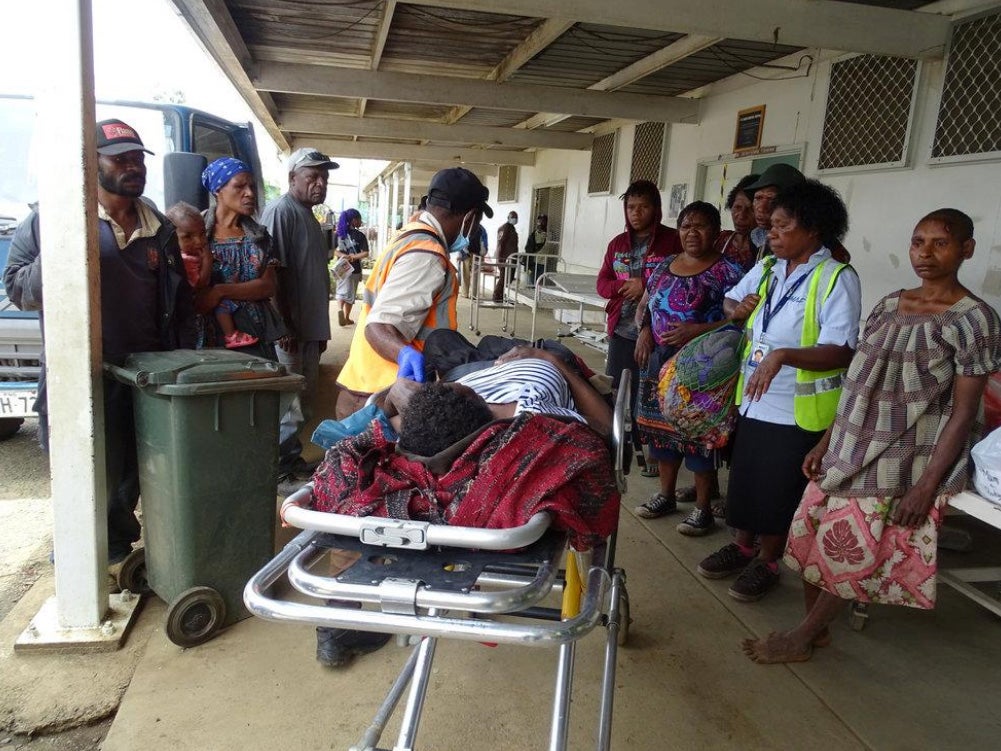Papua New Guinea struck by second earthquake killing at least 18 as aid workers scramble to rescue others
New 6.7 magnitude quake strikes close to epicentre of last week's disaster that saw 55 die as houses toppled and landslides crushed Highland villages

Your support helps us to tell the story
From reproductive rights to climate change to Big Tech, The Independent is on the ground when the story is developing. Whether it's investigating the financials of Elon Musk's pro-Trump PAC or producing our latest documentary, 'The A Word', which shines a light on the American women fighting for reproductive rights, we know how important it is to parse out the facts from the messaging.
At such a critical moment in US history, we need reporters on the ground. Your donation allows us to keep sending journalists to speak to both sides of the story.
The Independent is trusted by Americans across the entire political spectrum. And unlike many other quality news outlets, we choose not to lock Americans out of our reporting and analysis with paywalls. We believe quality journalism should be available to everyone, paid for by those who can afford it.
Your support makes all the difference.A magnitude 6.7 earthquake struck Papua New Guinea’s mountainous Southern Highlands on Wednesday killing at least 18 people, an official said, a week after a larger quake flattened villages and killed at least 55 people.
The tremor, shortly after midnight local time, struck just 31 km (19 miles) southwest of the epicentre of last Monday’s magnitude 7.5 quake that has left government and aid agencies scrambling to provide emergency supplies to the remote region.
Australia and New Zealand said on Wednesday they would increase aid to Papua New Guinea.
Australia will deploy three helicopters this week to deliver aid, while New Zealand will send a second military plane to distribute medical equipment, hygiene kits and tarpaulins.
Wednesday’s quake was the most severe of a series of aftershocks that have rattled the resource-rich region, about 600 km (370 miles) northwest of the capital Port Moresby.
William Bando, the administrator of Hela Province, said initial reports put the death toll from the aftershock at 18.
“It appears Hides was hardest hit. We haven’t heard about potential casualties there yet, but it is a big village with many people,” he added.
Manasseh Makiba, Papua New Guinea’s Vice Minister for Petroleum & Energy who represents parts of Hela Province in parliament, said victims were still being found.
“People are still being extracted from mud. People are still being taken to hospitals,” he said.
Local media outlets reported the death toll from the original quake had risen to 75, after government officials said previously that 55 people had been killed.
A spokeswoman at Papua New Guinea’s National Disaster Center said on Wednesday that authorities were finalising a final report into the casualties from the first quake.
James Komengi, a United Church project officer, speaking from Tari, the capital of quake-affected Hela province, said his church’s assessment and response centre had counted up to 67 deaths in that province alone.
Aid efforts are being hampered as rescue workers struggle to reach the highlands area as many roads are either badly damaged or blocked.
The International Red Cross warned the situation could deteriorate if heavy rains hit the region.
“We are anxious to reach communities while there is a lull in what is usually a season of heavy rain. A big downpour could bring landslides in hillsides already destabilized by the earthquake, cause floods and contaminate water,” said Udaya Regmi, Director the International Red Cross in Papua New Guinea.
The Red Cross said its initial assessments indicate that as many as 143,000 people could have been affected, with an estimated 500 people injured and 17,000 people displaced from their homes. Even in more accessible areas of the country, health facilities have been damaged.
ExxonMobil, which shut its $19 billion PNG liquefied natural gas (LNG) project after the first quake, said on Wednesday its facilities in Hides, where it runs a gas conditioning plant, were safely shut in. All employees and contractors were safe.
Reuters
Join our commenting forum
Join thought-provoking conversations, follow other Independent readers and see their replies
Comments